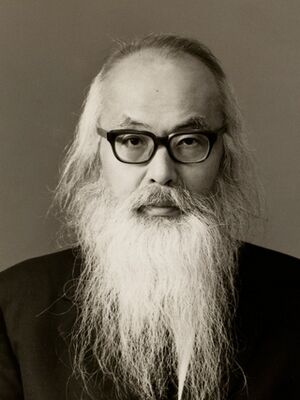Hirofumi Uzawa facts for kids
Quick facts for kids
Hirofumi Uzawa
|
|
|---|---|
| 宇沢 弘文 | |
 |
|
| Born | July 21, 1928 |
| Died | September 18, 2014 (aged 86) |
| Nationality | Japanese |
| Institution | Stanford University University of California at Berkeley University of Chicago University of Tokyo Chuo University Doshisha University |
| Field | Mathematical economics |
| Alma mater | University of Tokyo (B.Math, 1951) Stanford University Tohoku University (Ph.D., 1962) |
| Doctoral students |
David Cass Karl Shell Miguel Sidrauski |
| Influences | Shokichi Iyanaga Joichi Suetsuna Kenneth Arrow Hajime Kawakami |
| Contributions | Uzawa two-sector growth model Uzawa iteration Uzawa condition Integrability of demand |
| Awards | Person of Cultural Merit (1983) Order of Culture (1997) Blue Planet Prize (2009) |
| Information at IDEAS / RePEc | |
Hirofumi Uzawa (宇沢 弘文, Uzawa Hirofumi, July 21, 1928 – September 18, 2014) was a very important Japanese economist. An economist is someone who studies how money, goods, and services are made, shared, and used in a country or the world. Uzawa was especially known for using mathematics to understand how economies grow and change.
Contents
About Hirofumi Uzawa
Uzawa was born on July 21, 1928, in Yonago, Tottori, a city in Japan. He grew up in a farming family.
He went to the Tokyo First Middle School and later the First Higher School. These were important schools in Japan.
In 1951, he finished his studies in mathematics at the University of Tokyo. While studying, he read a quote that said, "There is no wealth, but life." This idea made him decide to study economics.
His Time in America
Uzawa's ideas about how to plan an economy caught the eye of a famous economist named Kenneth Arrow from Stanford University.
In 1956, Uzawa moved to the United States to study economics at Stanford. He went there with a special scholarship called the Fulbright Program.
He became a teacher at Stanford and later at the University of California, Berkeley in 1960. In 1964, he became a professor at the University of Chicago.
In 1962, he earned his Ph.D. degree from Tohoku University in Japan.
Teaching and Students
Uzawa taught at many famous universities. Some of his students became very well-known economists themselves. For example, Joseph E. Stiglitz and George A. Akerlof studied under him at the University of Chicago. Both of them later won the Nobel Prize in economics!
He also taught at Niigata University, Chuo University, and the United Nations University. Later, he returned to Japan and became a professor at the University of Tokyo in 1969.
Uzawa was also the president of the Econometric Society from 1976 to 1977. This is a group for economists who use math and statistics in their work.
His Economic Ideas
Hirofumi Uzawa was a leader in a field called mathematical economics. This means he used advanced math to create models and theories about how economies work.
Understanding Economic Growth
He helped create the "growth theory" for neoclassical economics. This theory tries to explain how economies grow over time.
Some of his important ideas include:
- Uzawa–Lucas model: This model helps explain how education and new ideas can lead to economic growth.
- Uzawa iteration: This is a mathematical method used to solve certain problems in economics.
- Uzawa condition: This is a rule or principle used in economic models.
In 1965, Uzawa developed a model that showed how new technologies and improvements happen because of money invested in research and education. This was an early idea for what is now called "endogenous growth theory." It means that economic growth can come from within the economy itself, not just from outside factors.
Awards and Honors
Uzawa received many important awards for his work:
- 1983: He was named a Person of Cultural Merit. This is a special honor given by the Japanese government to people who have made great contributions to Japanese culture.
- 1989: He became a member of the Japan Academy.
- 1997: He received the Order of Culture. This is one of Japan's highest honors, given to people who have made outstanding achievements in arts, science, or culture.
- 2009: He won the Blue Planet Prize. This award recognizes people who have made big contributions to solving global environmental problems.
 | Sharif Bey |
 | Hale Woodruff |
 | Richmond Barthé |
 | Purvis Young |

